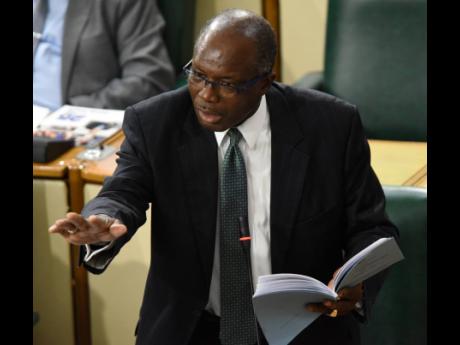Warmington wants Integrity Commission’s prosecutorial powers yanked
Lawmaker Everald Warmington has proposed sweeping changes to the Integrity Commission Act that would overhaul the anti-corruption body, excising the auditor general from the rank of commissioners and reverting the prosecutorial role to the director of public prosecutions.
Warmington, who is a member of the Joint Select Committee reviewing the Integrity Commission Act 2017, requested to make a submission in his capacity as the member of parliament for St Catherine South Western on Wednesday.
He suggested that the prosecutorial powers vested in the commission be scrapped, saying such powers are constitutionally vested in the director of public prosecutions.
The government lawmaker wants Section 1(a) of the Integrity Commission Act appointing the auditor general to the body to be deleted and replaced as Parliament deems appropriate.
He said the removal of the auditor general from the commission would do no harm to the anti-corruption body as she may, at any time, conduct an audit of the commission’s affairs.
He also argued that the auditor general is constitutionally required to present the audit reports to Parliament.
“It is clearly untenable for the auditor general to carry out an audit of a committee of Parliament of which the auditor general is a member,” he argued.
Warmington also wants the parent law to be amended to allow for the statutory declarations of members of the commission and its staff to be gazetted.
He charged that the legislative framework and the act make it clear that the Integrity Commission is “not a law unto itself – not an unbridled horse – as some may want it to be”.
The MP is also attempting to shut down the powers of the Integrity Commission to request information on statutory declarations pre-dating the promulgation of the law in 2017.
He told committee members that he was informed that the commission had requested information on past statutory reports, claiming that those declarations were incomplete.
He recommended that the “commission should not have any jurisdiction to carry out any proceedings under the act before it was passed”.
Further, Warmington wants a removal of Section 55 (5) of the Act, which provides parliamentary privilege to the commission when it submits its reports of investigation to Parliament.
The provision states: “For the purposes of the Defamation Act, any report made by the commission under this act and any fair and accurate comment thereon shall be deemed to be privileged.”
Warmington is also pushing for the findings of probes by the director of investigations to be submitted to the commission, through the executive director, together with the ruling of the director of public prosecutions.
He is suggesting that an impeachment framework be crafted in law to address actions of misconduct by the commissioners or the executive director.
During Wednesday’s meeting opposition senator Peter Bunting questioned the quality of reports being submitted to Parliament by the commission.
He complained about a 2022 report it had sent to Parliament implicating him in a scandal that rocked the Firearm Licensing Authority. A special investigation report identified Bunting as one of two former national security ministers who granted firearm permits to persons with criminal traces. The other was Robert Montague.
However, Bunting told the committee that the commission deliberately omitted from its report that he was acting in accordance with the firearm review board set up by the minister.
“The commission should reflect on how they have been operating,” he said.
In a tweet yesterday, Jamaicans for Justice Executive Director Mikel Jackson questioned whether lawmakers were “hell-bent on reducing” the powers of the Integrity Commission.
“It’s always interesting to note the areas that bring bipartisan support. Case in point, the Integrity Commission,” she added.
Meanwhile, on the matter of corruption, a recent US State Department report on Jamaica said that the government did not effectively implement the law to combat the problem.

